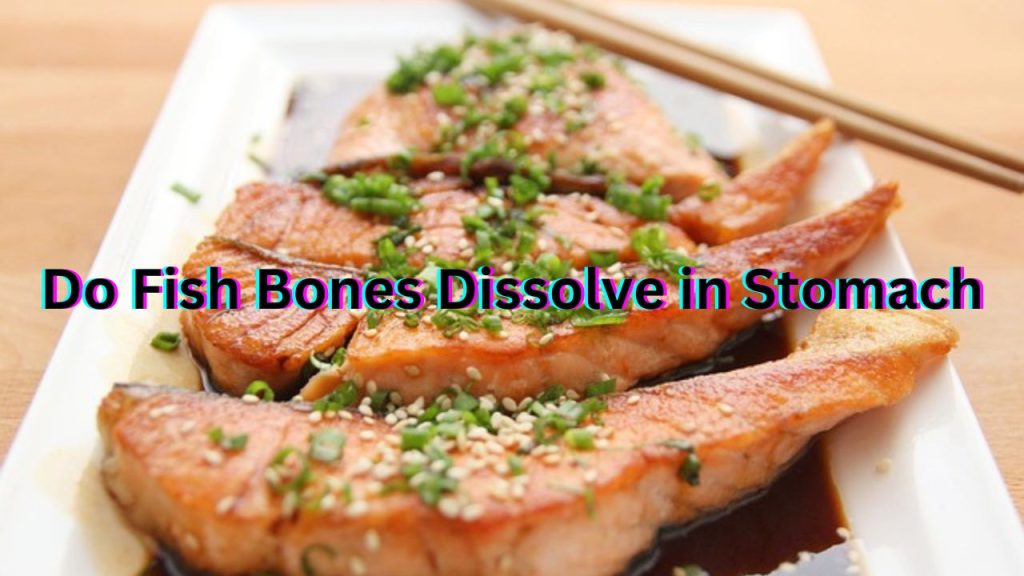Do fish bones dissolve in stomach? Learn about the signs to look out for, how to handle fish bones properly, and what happens if you ingest one.
Do Fish Bones Dissolve in Stomach?
A very nutrient-dense dietary option, fish is high in protein, omega-3 fatty acids, and vital vitamins and minerals. The chance of inadvertently in
gesting a fish bone, however, is a frequent worry while eating fish. The question of whether these bones disintegrate in the stomach or if they might lead to digestive system problems is frequently asked.Whether fish bones dissolve in the stomach, what to check for if you get trapped, and how to handle such circumstances will all be covered in detail in this article. Let’s get into the specifics!
Is Eating Fish Bones Healthy?
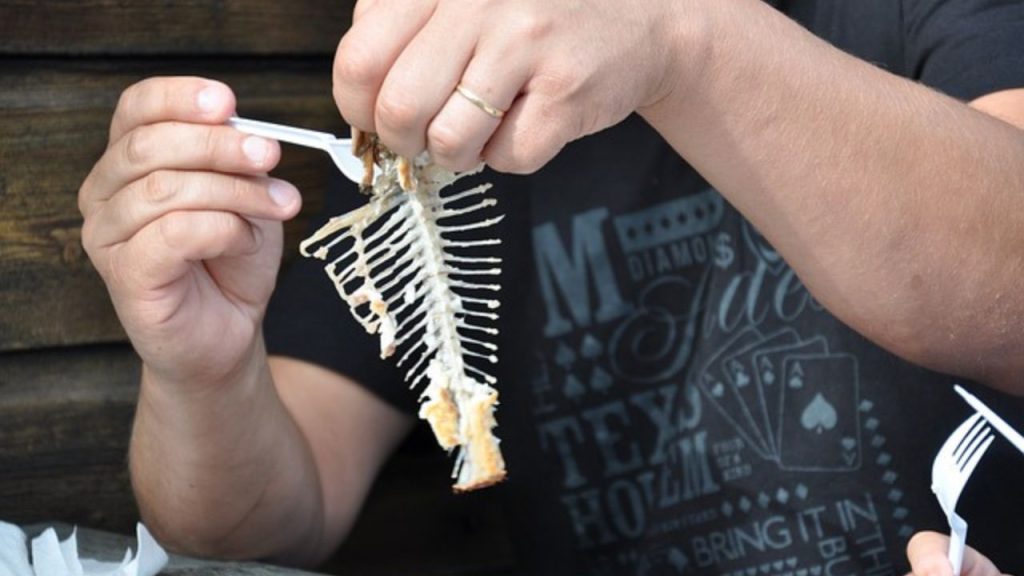
Although purposefully eating fish bones is uncommon, some people may be curious about the potential health advantages. Calcium and other nutrients are abundant in fish bones, but are these advantages worth the possible risks?
Benefits of Fish Bones
High levels of calcium, phosphorus, and collagen are found in fish bones, all of which support healthy bones and general well-being. To increase calcium intake, which helps promote bone density, teeth, and joint health, certain cultures eat little fish with microscopic bones intact.
Risks of Eating Fish Bones
It is typically not advised to eat fish bones, even with these possible advantages. Small bones can scrape the tongue, throat, or digestive tract and are challenging to chew. Sharp bones are more likely to cause pain or damage, especially from bigger fish, and the danger of these problems frequently outweighs any potential health advantages.
Fish Bone Stuck in Stomach Symptoms
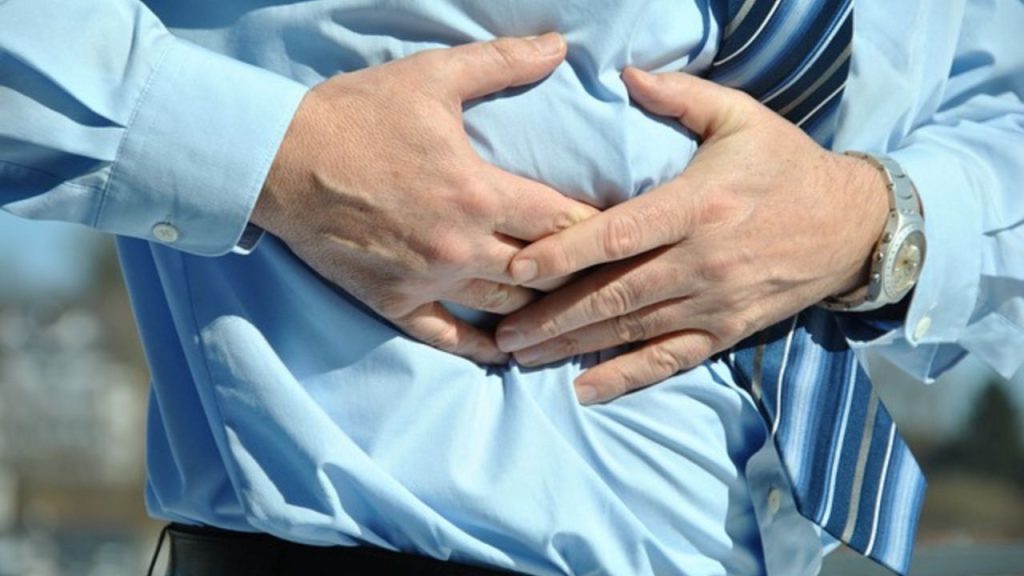
While swallowing a little fish bone may not result in any symptoms, it can occasionally become trapped in the digestive tract and cause pain or discomfort. Here are some symptoms to watch out for if you think a fish bone could be lodged in your esophagus or stomach.
Symptoms of a Fish Bone Lodged in the Stomach
Usually, one of the first indications that a bone has been lodged is a slight soreness in the stomach region. Abdominal soreness, slight pain, or a fullness sensation are some of the symptoms. Rarely, a fish bone may pierce the lining of the stomach, resulting in more severe symptoms including severe discomfort and perhaps bleeding.
Potential Complications
The majority of fish bones travel through the digestive tract without any problems, but if a bone irritates the stomach or intestines or punctures them, problems may occur. Since untreated problems can result in infection or even peritonitis (a dangerous abdominal infection), it is essential to keep an eye on symptoms and seek medical care if discomfort continues or gets worse.
Will a Fish Bone Dissolve in the Throat?
Although our systems have strong digestive acids, are they able to break up fish bones lodged in the throat? The fact that even powerful stomach acid may have trouble breaking down solid, pointy fish bones surprises a lot of people.
Throat Acids and Fish Bones
Certain kinds of bones can eventually disintegrate in stomach acid, but fish bones in the neck are a different story. Fish bones lodged in the neck may stay there longer without the stomach’s churning activity, which would be uncomfortable and irritating. Despite the strong acidity of stomach acid, a fish bone in the throat usually has to be manually removed or dislodged with further assistance.
How Long Does It Take?
Fish bones may ultimately move down the esophagus on their own in certain situations, but this might take anything from a few hours to several days. To avoid difficulties, it is advised to get medical help if a fish bone stays in the throat for longer than twenty-four hours.
Is It Risky to Have a Fish Bone lodged in Your Throat?

The severity of a fish bone lodged in the throat might vary from moderately bothersome to seriously alarming. Is a bone in the throat really hazardous, even if it might induce anxiety? Here is a summary of the essential information.
Potential Dangers
Small fish bones may scratch the lining of the throat but generally do not pose severe threats. Larger or sharper bones, however, can damage surrounding tissue and may become more deeply lodged, raising the risk of infection. In rare cases, severe complications can occur, including abscesses or injuries that make swallowing difficult.
When to Seek Medical Help
See a doctor right away if you experience swelling, trouble swallowing, or ongoing pain. These signs can point to more serious injury from the bone, necessitating its removal by a specialist.
What to Do If You Swallow a Fish Bone
Although swallowing a fish bone by accident might be shocking, there are things you can do to help it pass through your system easily and with no discomfort. These are the most effective techniques to attempt.
Quick Actions
Drinking a glass of water first can aid in the bone’s passage into the stomach. Aggressive drinking, however, should be avoided since it may exacerbate pain or result in choking. Another way to “catch” the bone and force it through the throat is to attempt swallowing a soft, sticky item, such as a banana.
Foods That May Help
Bulky or soft foods, such as bread, mashed potatoes, or rice, can coat the bone and create a smoother path for it through your digestive system. These foods can act as a cushion to reduce the chances of any scratches or discomfort.
Swallowed Fish Bone Stomach Pain
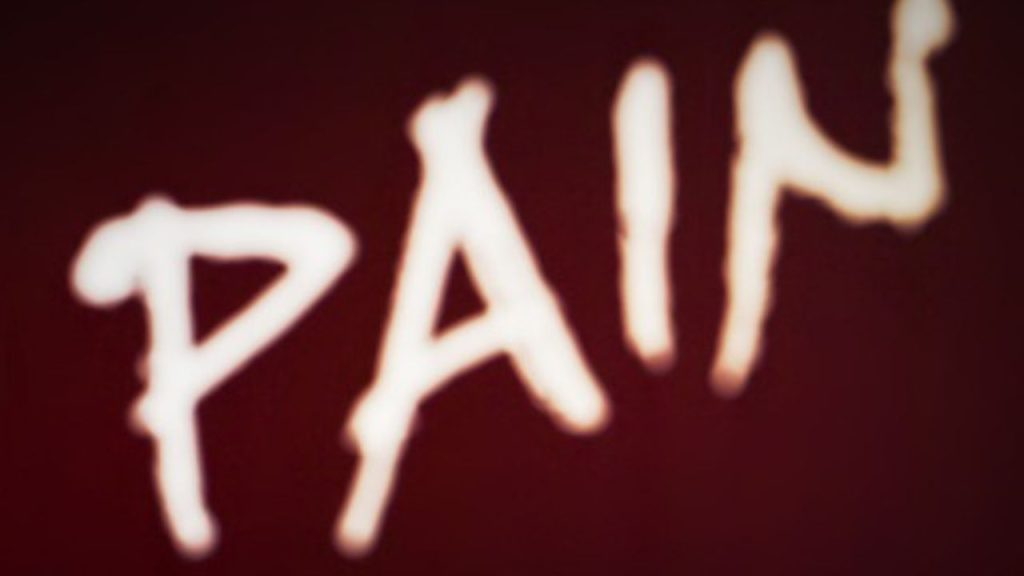
After ingesting a fish bone, experiencing stomach pain might indicate irritation or that the bone is causing problems. Here are some tips for recognizing and treating stomach pain caused by ingested fish bones.
Pain Types to Look for
After ingesting a fish bone, stomach discomfort might be minor or localized and intense. Sharp pain might mean that the bone has been trapped or is causing damage, but a gentle aching can mean that the bone is passing through the digestive tract.
Other Symptoms Accompanying Pain
If the bone becomes lodged or irritates the stomach lining, further symptoms including bloating, nausea, or discomfort may appear. Rarely, the bone may irritate or pierce the lining, resulting in blood in the stool.
If a pregnant woman swallows a fish bone, what would happen?
Even small health issues can create a lot of anxiety during pregnancy. What would happen, then, if you were pregnant and unintentionally swallowed a fish bone? Let’s examine the best practices and possible hazards.
Dangers to Expectant Mothers
Pregnancy difficulties are usually not increased by ingesting a fish bone. It may, however, result in unpleasant stress and pain. Seeing a doctor might offer comfort and advice on whether additional measures are required if pain or other symptoms appear.
Preventive Tips for Pregnant Women
Pregnant women may want to avoid fish with small bones or opt for filleted, boneless fish varieties. Checking the fish carefully for bones or cutting it into small pieces before eating can also help prevent accidental swallowing.
Can Swallowing a Fish Bone Cause Death?
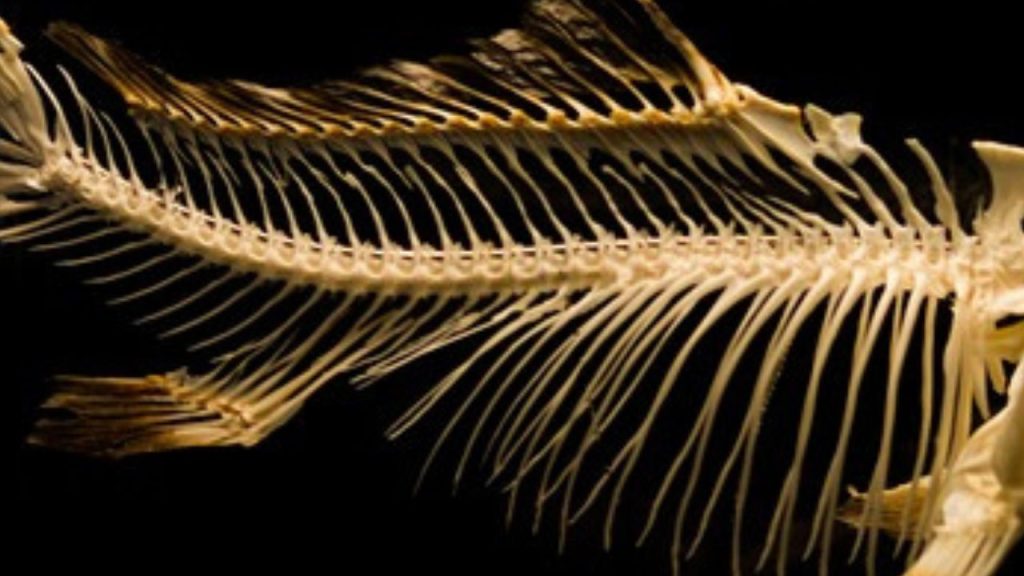
Some people may find the idea of ingesting a fish bone insignificant, but others may be concerned about the serious consequences. Can ingesting a fish bone result in serious repercussions, such as death?
Infrequent But Potential Issues
Although it is quite uncommon, death from ingesting a fish bone is not completely out of the question. Complications may occur if a bone punctures an important organ or results in a serious infection. Infections or abscesses from bone injuries have occasionally resulted in major health problems.
Knowing When to Worry
If you have a high temperature, significant discomfort after swallowing a bone, or signs of infection, you should visit a doctor very once. Even though deaths are uncommon, it’s important to be safe in case symptoms develop.
Additional Tips for Handling Fish Bones
You may enjoy fish worry-free if you know how to avoid swallowing a fish bone and what to do if you do. Here are some useful pointers to reduce the possibility of inadvertently consuming fish bones.
Carefully Chew Fish
Chewing slowly and carefully helps identify fish bones before they reach the throat, making it one of the easiest strategies to prevent swallowing them. Additionally, taking smaller pieces reduces the possibility of inadvertently swallowing a bone.
Choose Boneless Fish Instead
Selecting boneless fish kinds, such as filleted fish or fish sticks, might provide piece of mind and lower the chance of inadvertent ingestion if you’re very worried about ingesting bones.
Conclusion
Knowing what to anticipate can make all the difference in the unexpected and perhaps unnerving sensation of swallowing a fish bone. Because of the body’s inherent mechanisms, the majority of fish bones will easily pass through the digestive system. However, being aware of the signs and knowing what to do can help you handle situations when a bone becomes trapped or causes discomfort with confidence. Being composed and proactive is crucial, whether that means drinking water, eating soft foods to assist move the bone along, or getting medical aid if needed.
Even though fish bones provide nutritious value, it’s essential to be cautious while eating fish to prevent accidental ingesting. The danger can be decreased by chewing properly and, if at all feasible, choose boneless choices. Keep in mind that Although swallowing a fish bone seldom results in major issues, you may still enjoy your dinner safely if you are aware of the risks. Thus, you may enjoy a tasty fish meal with assurance the next time, knowing that you’re ready to deal with any unforeseen fish bone encounters.

